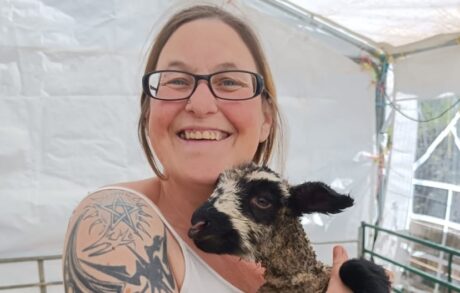Entrepreneur: Rachel Holland
Business name: Miss Rachel Holland
Industry: Retail
Business location: Maldon, Essex
Turning a passion into a business
“I made my first candle when I was 10,” says Rachel. “A teacher taught us how, and I was just captivated by it.”
Despite her passion for candle making – she jokes that her family would label it an “obsession” – Rachel never considered turning it into a business. Instead, she forged a successful career as an insurance underwriter, working at Lloyds for 26 years.
“I had always been a single parent,” explains Rachel, “and while I loved my job, I had committed to it for my daughter.” Yet it ended up being Rachel’s daughter that prompted her career change.
She wanted to get some wax melts – scented pieces of wickless wax that are melted over a flame in a wax warmer. Rachel said, “I’m not going to buy those when I can make anything like that!”
From there, Rachel kept producing more and more wax melts – for family and friends, before her daughter suggested she sell them online. So Rachel made it her New Year’s resolution to start a business.
“On 1 January 2019, I set out a plan that I was going to start a business that year,” says Rachel. “It was a really rough sketch, with a breakdown of how I was going to do it – my deadline was 1 May, and that’s the date I launched the website.”
Funding the business
Despite launching her online store in May 2019, Rachel kept working as an underwriter until she opened her business premises in 2020. It was her salary from Lloyds, combined with the use of credit cards, that funded Miss Rachel Holland in its early days.
“I racked up that credit card bill quite quickly, and I didn’t take a wage [from the business] for at least two years,” Rachel says. “I pumped everything back into the business. It was terrifying, but equally, I believed in it so much that I knew everything was going to be OK.”
She adds,“If you have a job at the same time as your side hustle, I recommend keeping that job going as long as you can. Drop your days down to three days, two days, and eventually time will dictate when you can let go.”
» COMPARE: Business credit cards
Knowing your customer
Rachel’s first business challenge was one common to many small businesses in the NerdWallet community: knowing your customer.
“Everything I thought I knew about my customers, I didn’t,” Rachel admits. “Although I had been making [home fragrances] for a long time, and I knew what I liked, I didn’t know what the public at large really liked. Some products I thought would be really popular weren’t.”
Now Rachel recognises that’s all part of the learning process. “They say that if you aren’t embarrassed by your first product launch, you launched it too late,” she laughs.
Running costs
In the last few years, Rachel’s company has been hit from all sides. The business energy bill for her workshop rose from £500 to £1,500 a month, leading Rachel to reduce the lighting at her premises.
Wax costs, meanwhile, went up threefold. “It is a wholesale natural product, and the price varies from month to month, making it quite difficult to manage,” explains Rachel. “But you have to try and keep your prices flat – you can’t keep putting them up and down.”
All this came at a time when consumers were cutting their own spending. “Retail shops are not recession proof, not in the slightest. Neither are online shops, especially if you sell a luxury item – it’s the first thing to be cut back.”
For any other small businesses in a similar situation Rachel recommends digging down into what is already successful. “It’s a good idea to cut back on your inventory,” suggests Rachel. “Find what your customers really want, like your bestsellers, and give them more of it.”
» MORE: How small businesses are prioritising their time and money
Expecting the unexpected
Looking back on her business journey, Rachel wishes that she had built a financial cushion to help her get through lean times.
“I wish I had saved for the unexpected,” she admits. “Things were fabulous for a few years, so I wish I had saved a lot more money at the beginning, rather than pumping so much into the business. That would have been a lot more helpful.”
Yet Rachel admits that the unpredictability of running a business can make it hard to do this. “Life is full of surprises and there is always something around the corner,” she says. “I think that the biggest lesson is that you really do have to expect the unexpected. You’ve just got to roll with the punches at all times.”
» MORE: Business saving accounts
This article was originally written by Connor Campbell in March, 2023. It has since been edited and updated.








